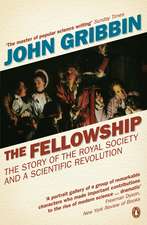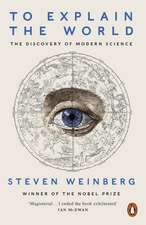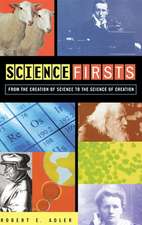The Kaiser Wilhelm Institute for Anthropology, Human Heredity and Eugenics, 1927-1945: Crossing Boundaries: Boston Studies in the Philosophy and History of Science, cartea 259
Autor Hans-Walter Schmuhlen Limba Engleză Paperback – 19 noi 2010
| Toate formatele și edițiile | Preț | Express |
|---|---|---|
| Paperback (1) | 953.35 lei 6-8 săpt. | |
| SPRINGER NETHERLANDS – 19 noi 2010 | 953.35 lei 6-8 săpt. | |
| Hardback (1) | 959.98 lei 6-8 săpt. | |
| SPRINGER NETHERLANDS – 13 feb 2008 | 959.98 lei 6-8 săpt. |
Din seria Boston Studies in the Philosophy and History of Science
- 18%
 Preț: 944.19 lei
Preț: 944.19 lei - 15%
 Preț: 646.75 lei
Preț: 646.75 lei - 15%
 Preț: 646.75 lei
Preț: 646.75 lei - 15%
 Preț: 699.28 lei
Preț: 699.28 lei - 18%
 Preț: 736.50 lei
Preț: 736.50 lei - 18%
 Preț: 706.87 lei
Preț: 706.87 lei - 15%
 Preț: 643.16 lei
Preț: 643.16 lei - 15%
 Preț: 650.69 lei
Preț: 650.69 lei - 15%
 Preț: 634.18 lei
Preț: 634.18 lei - 15%
 Preț: 642.68 lei
Preț: 642.68 lei -
 Preț: 391.40 lei
Preț: 391.40 lei -
 Preț: 383.33 lei
Preț: 383.33 lei - 18%
 Preț: 944.19 lei
Preț: 944.19 lei - 18%
 Preț: 955.56 lei
Preț: 955.56 lei - 15%
 Preț: 643.65 lei
Preț: 643.65 lei -
 Preț: 392.75 lei
Preț: 392.75 lei - 18%
 Preț: 1229.10 lei
Preț: 1229.10 lei - 18%
 Preț: 1238.23 lei
Preț: 1238.23 lei - 18%
 Preț: 951.29 lei
Preț: 951.29 lei - 18%
 Preț: 1223.25 lei
Preț: 1223.25 lei - 18%
 Preț: 1225.79 lei
Preț: 1225.79 lei - 18%
 Preț: 1226.42 lei
Preț: 1226.42 lei - 18%
 Preț: 1236.82 lei
Preț: 1236.82 lei - 15%
 Preț: 644.49 lei
Preț: 644.49 lei - 18%
 Preț: 1231.78 lei
Preț: 1231.78 lei - 15%
 Preț: 644.30 lei
Preț: 644.30 lei - 18%
 Preț: 957.62 lei
Preț: 957.62 lei - 18%
 Preț: 1222.49 lei
Preț: 1222.49 lei - 18%
 Preț: 947.50 lei
Preț: 947.50 lei - 18%
 Preț: 1833.95 lei
Preț: 1833.95 lei - 18%
 Preț: 1227.99 lei
Preț: 1227.99 lei - 18%
 Preț: 947.35 lei
Preț: 947.35 lei
Preț: 953.35 lei
Preț vechi: 1162.61 lei
-18% Nou
Puncte Express: 1430
Preț estimativ în valută:
182.46€ • 189.98$ • 154.19£
182.46€ • 189.98$ • 154.19£
Carte tipărită la comandă
Livrare economică 10-24 martie
Preluare comenzi: 021 569.72.76
Specificații
ISBN-13: 9789048176786
ISBN-10: 9048176786
Pagini: 484
Ilustrații: XIV, 468 p.
Dimensiuni: 155 x 235 x 25 mm
Greutate: 0.67 kg
Ediția:Softcover reprint of hardcover 1st ed. 2008
Editura: SPRINGER NETHERLANDS
Colecția Springer
Seria Boston Studies in the Philosophy and History of Science
Locul publicării:Dordrecht, Netherlands
ISBN-10: 9048176786
Pagini: 484
Ilustrații: XIV, 468 p.
Dimensiuni: 155 x 235 x 25 mm
Greutate: 0.67 kg
Ediția:Softcover reprint of hardcover 1st ed. 2008
Editura: SPRINGER NETHERLANDS
Colecția Springer
Seria Boston Studies in the Philosophy and History of Science
Locul publicării:Dordrecht, Netherlands
Public țintă
Professional/practitionerCuprins
A “Purely Theoretical Institute for the Study of the Nature of Man”: The Founding of the Kaiser Wilhelm Institute for Anthropology, Human Heredity, and Eugenics, 1920–1927.- “The Human of the Future Under the Scrutiny of Research”: The Kaiser Wilhelm Institute for Anthropology, Human Heredity and Eugenics in the Weimar Republic, 1927–1933.- The “Faustian Bargain”: The Kaiser Wilhelm Institute for Anthropology, Human Heredity and Eugenics in the National Socialist Era, 1933–1938/1942.- In the Realm of Opportunity: The Kaiser Wilhelm Institute for Anthropology, Human Heredity and Eugenics during World War II, 1938/42–1945.- Boundary Transgressions.
Recenzii
From the reviews:
“Schmuhl demonstrates how carefully and completely Fischer’s institute came to be integrated into the Nazi racial hygiene policies … . Schmuhl and other historians have scrutinized carefully the basic research carried out at the Kaiser Wilhelm Institute for Anthropology. … this was both high-quality work by the standards of the day, and well-integrated into the racial hygiene policies of the regime. … make significant contributions to a more subtle and deeper understanding of how science and Nazism interacted.” (Mark Walker, Metascience, Vol. 19, 2010)
“Schmuhl demonstrates how carefully and completely Fischer’s institute came to be integrated into the Nazi racial hygiene policies … . Schmuhl and other historians have scrutinized carefully the basic research carried out at the Kaiser Wilhelm Institute for Anthropology. … this was both high-quality work by the standards of the day, and well-integrated into the racial hygiene policies of the regime. … make significant contributions to a more subtle and deeper understanding of how science and Nazism interacted.” (Mark Walker, Metascience, Vol. 19, 2010)
Textul de pe ultima copertă
When the Kaiser Wilhelm Institute for Anthropology, Human Heredity and Eugenics opened its doors in 1927, it could rely on wide political approval, ranging from the Social Democrats over the Catholic Centre to the far rightwing of the party spectrum. In 1933 the institute and its founding director Eugen Fischer came under pressure to adjust, which they were able to ward off through Selbstgleichschaltung (auto-coordination). The Third Reich brought about a mutual beneficial servicing of science and politics. With their research into hereditary health and racial policies the institute’s employees provided the Brownshirt rulers with legitimating grounds. At international meetings they used their scientific standing and authority to defend the abundance of forced sterilizations performed in Nazi Germany. Their expertise was instrumental in registering and selecting/eliminating Jews, Sinti and Roma, "Rhineland bastards", Erbkranke and Fremdvölkische. In return, hereditary health and racial policies proved to be beneficial for the institute, which beginning in 1942, directed by Otmar Freiherr von Verschuer, performed a conceptual change from the traditional study of races and eugenics into apparently modern phenogenetics – not least owing to the entgrenzte (unrestricted) accessibility of people in concentration camps or POW camps, in the ghetto, in homes and asylums. In 1943/44 Josef Mengele, a student of Verschuer, supplied Dahlem with human blood samples and eye pairs from Auschwitz, while vice versa seizing issues and methods of the institute in his criminal researches.
The volume at hand traces the history of the Kaiser Wilhelm Institute for Anthropology, Human Heredity and Eugenics between democracy and dictatorship. Special attention is turned to the transformation of the research program, the institute’s integration into the national and international science panorama, and its relationship to the ruling power as well as its interconnection to thepolitical crimes of Nazi Germany.
The volume at hand traces the history of the Kaiser Wilhelm Institute for Anthropology, Human Heredity and Eugenics between democracy and dictatorship. Special attention is turned to the transformation of the research program, the institute’s integration into the national and international science panorama, and its relationship to the ruling power as well as its interconnection to thepolitical crimes of Nazi Germany.
Caracteristici
The first book to examine German biomedical science and its social applications in the country’s most renowned institute for the human sciences in the inter-War years Confronts the daunting question of how the life sciences under National Socialism could terminate in bestial medical crimes on “valueless” human beings This case study offers a sophisticated analysis of the complex interface of science, politics and ethics –one that transcends the scope of this particular work














